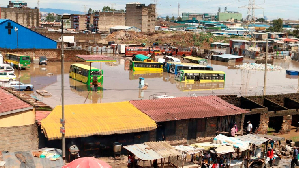- Home - News
- TWI News | TV
- Polls
- Year In Review
- News Archive
- Crime & Punishment
- Politics
- Regional
- Editorial
- Health
- Ghanaians Abroad
- Tabloid
- Africa
- Religion
- Election 2020
- Coronavirus
- News Videos | TV
- Photo Archives
- News Headlines
- Press Release
General News of Tuesday, 3 May 2011
Source: The Herald
Mills Boogies in Tamale
By Gifty Arthur
Appearing safer and freer in Tamale, any other town he has been to since his nationwide tour, President John E. A. Mills, was moved to joined an ecstatic crowd which had been waiting for him at the Jubilee Park to welcome him on his four-day working visit, to exhibit a bit of his dancing prowess.
Earlier reports were that the place was going to be hostile and people unreceptive towards him.
A day before his arrival, two youth groups, ‘Sons and Daughters of Atta Mills’ and ‘Nasara Club’, both in Northern Region, had in a press statement called on him to cancel his trip to the region since they claimed the residents were disappointed in him for his failure to honour promises to them to find and nail the killers of the slain overlord of Dagbon Traditional Area, Ya-Na Yakubu Andani II.
They had cautioned that intelligence reports revealed that the grounds were not fertile for his visit, adding that residents were not going to welcome him because they were disappointed in him.
But contrary to these claims, although President Mills arrived uncharacteristically late at the durbar grounds, the people gave him one of the warmest receptions, amidst drumming and dancing.
Koku Anyidoho, his Press Secretary, explained later that the president was swarmed by the residents of Tamale right his aircraft touched down, hence he had to thread a journey of 20 minutes in almost two hours.
And, as if competing with his challenger in the NDC flag bearer race, Nana Konadu Agyemang Rawlings, who has been described as a ‘good dancer’, President Mills whilst going round to greet the chiefs and people, displayed a few dancing moves to the amazement of all gathered.
He is often seen throwing his handkerchief into the air with his right hand hardly moving his body.
Whilst some were surprised at the act, others clapped and cheered him on. He was at the Park to launch an initiative by government in partnership with Zoomlion Ghana to solve unemployment at the national level.
Local Enterprises and Skills Development Programme (LESPED), according to the National Programme Manager, Mr. Adam Gariba, is to create sustainable local businesses.
To this end, Mr. Gariba said that the vision of the programme is to generate 10,000 jobs annually, adding that currently, 6,000 people have been enrolled into it. Additionally, 40,000 people, he said, are envisaged to be recruited to complete the annual target before the year ends.
The programme which will provide skills development, training facilities, easy-to-handle trade machines and a host of other opportunities, will be implemented in close collaboration with all the relevant stakeholders which include the Ministries of Local Government and Rural Development, Youth and Sports and National Youth and Employment Programme.
To be part of the programme, one is expected to freely register at any of the 170 offices in the metropolitan, municipal and districts throughout the country.
Beneficiaries will be expected to undergo a series of training, and upon completion of the programme, the beneficiaries, through kind courtesy of Zoomlion Ghana Limited, will be supplied with the appropriate trade machine on very flexible repayment terms.
At the durbar grounds, some beneficiaries, displayed some of the machines supplied them by Zoomlion, and they demonstrated the skills that had been impacted on them.
Besides the various vehicles that were showcased, other machines such as cashew nut processing plant, fruit and vegetable washing, pea gender, juice machine, fruit mill and stream jacked kettle were also on displayed to the prospective participants to see.
President Mills launched the programme, and urged the unemployed, especially the youth, to take advantage of the initiative and enroll to get the necessary skills to better their lives.
In a short speech, the Minister for Local and Rural Development, Mr. Samuel Ofosu Ampofo, hoped the programme will help to drastically reduce the number of youth who travel to the cities in search of non-existent jobs.










